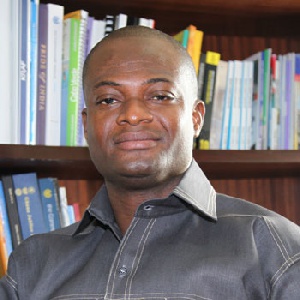 A Senior Law Lecturer at the Faculty of Law of the University of Ghana, Dr. Raymond Atuguba
A Senior Law Lecturer at the Faculty of Law of the University of Ghana, Dr. Raymond Atuguba
A Senior Law Lecturer at the Faculty of Law of the University of Ghana, Dr. Raymond Atuguba, has called for an urgent legal revolution to deal with the growing lawlessness in the country.
According to him, the delay tactics adopted by the Courts when it comes to justice delivery, makes it difficult for the citizenry to seek justice through the court system, thereby resulting in mob justice and other lawless actions.
The celebrated legal luminary, admitted that, “It takes too long to get to court; it costs too much when we get in there; and it’s ultra-crowded when we get there.
Also the principles of Law and Justice applied to us in there are alien to us; some imported from the Brits many centuries ago; we are lost in a maze of procedures and jargon, whilst we are in there; it takes too long to get out; the results we get from the court halls are often spiced with corruption and flavoured with politics; and our relationships are damaged after we get out.”
Dr. Atuguba was speaking at the maiden revolutionary lecture series under the theme: Restoring the values of probity, accountability and truth in contemporary governance in Accra, He spoke against the action of some lawyers who work for their political parties, against the principle of justice for all.
“We need to remember that in the adversarial system of law and justice we practice in Ghana, the party who has better lawyers, more resources, a greater capacity to influence judges and court officials, has truth on their side, at least temporarily”. Dr Atuguba stated.
He said, “moneyed justice” is dispensed, and the values of truth are often sidelined. This cannot continue. He further emphasised,”we need to inculcate in ourselves and in our leaders, a revolutionary spirit which will compel us and them to act.
Inaction is Ghana’s bane”. Other key Speakers for the maiden lecture were: Former Minister of Local Government and Rural Development Akwasi Opong Ofosu and former Minister of Justice and Attorney-General Dr. Benjamin Kumbour. The event brought together hundreds of NDC big wigs.
They included former President John Dramani Mahama, former Ministers of State, former and sitting Members of Parliament, former Chairman of The Party, Dr. Kwabena Adjei.
Also present were the General Secretary, Johnson Asiedu Nketia, former Youth and Sports Minister, Elvis Afriyie Ankra, Minority Leader, Haruna Iddrisu as well as the Party foot soldiers.
Background
On February 24, 1966 Ghana experienced her first military intervention in national governance.
The 1966 coup gave birth to a series of military interventions in Ghana.
January 13, 1972, July 5, 1978, June 4, 1979, and December 31, 1981 remind us of Ghana’s experience of military governance and their attempts to rein in a revolutionary change in the national governance of Ghana. However, the failures and the weaknesses that these military regimes sought to correct so as to transform the country also became their Achilles heels.
The birth of democratically elected governments, unfortunately, has also not resulted in the expected transformation of the citizenry. Years of study have proved that, a revolution as called for by Dr Atuguba will not be dependent on military or democratically elected governments.
It will take a lot more effort to have a dramatic and wide-reaching change in attitudes, behaviours, and operations that will lead to improved conditions of humanity.
These revolutions only bring about some fundamental changes in political power or organizational structures in a relative short period of time when the population rises up in revolt against the current authorities.
When revolution does not achieve a permanent revolutionary consciousness there is no Revolution. The Revolutionary Lecture Series is borne out of the experiences and philosophy of Flt. Lt. Jerry John Rawlings and the revolutionary transition Ghana went through.
The lecture seeks to perpetuate a Revolutionary Consciousness in the fabric of Ghanaian politics that will breed leaders that are modest, truthful and pursue social justice.